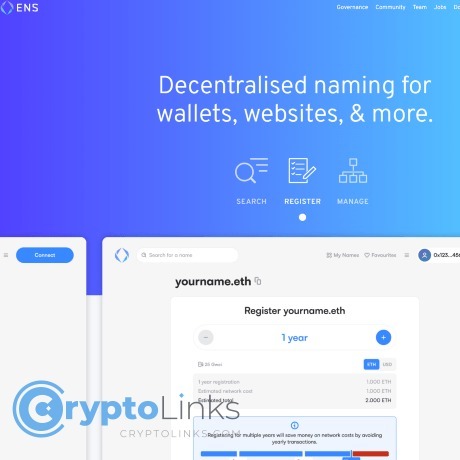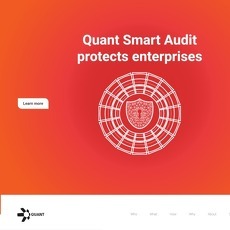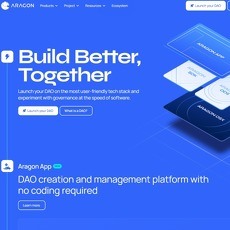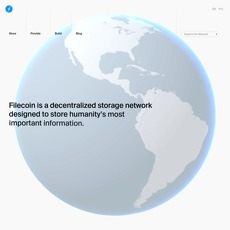Ethereum Name Service (ENS) Review
Ethereum Name Service (ENS)
ens.domains
Introduction to Ethereum Name Service (ENS)
I'm excited to introduce you to a domain service that is making significant waves in the world of Web3: The Ethereum Name Service, or 'ENS' for short. As the owner of Cryptolinks.com, I am always on the lookout for exciting and revolutionary platforms that are pushing the boundaries of the crypto space. ENS is certainly one of them! ENS is a truly innovative domain service that operates directly on the Ethereum Blockchain. Its unique approach and the disruptive potential it holds, is why I believe it deserves our attention. Just think about it: A domain service powered by one of the most powerful public blockchain networks out there! Launched in 2017, Ethereum Name Service humbly started as a resolver contract, and it now stands as one of the major domain services in the Web3 ecosystem. It offers an on-chain method to simplify Ethereum addresses, making them more user-friendly while maintaining the top-level security measures Ethereum is known for. Why is this important, you might ask? Well, the Ethereum blockchain, for all its glory, does involve long, complex addresses which can feel rather intimidating to those who are new to this space. ENS addresses this issue effectively by transforming those lengthy alphanumeric addresses into human-friendly domain names. It's clear to see why ENS is steadily gaining popularity. Its mission to decentralize web3 domain services is both bold and pioneering. Its aim to enhance the accessibility of Ethereum and blockchain technology is a valuable contribution to the crypto-sphere. I trust this brief overview has given you a taste of what ENS is all about. It's a platform that's managing to simplify and streamline blockchain interactions, making Ethereum user-focused and feasible for the larger market. In the next post, I will delve deeper into the Ethereum Name Service (ENS) to explore its features and how it actually works. Stay tuned for some fascinating insights!
Ethereum Name Service (ENS): Features and How It Works
Ethereum Name Service (ENS) is one of the fascinating elements of the blockchain world, having successfully harnessed the power of the Ethereum blockchain to provide public domains. Despite being technical, its operation is brilliantly simple for the end-users, which is one of the reasons why I am enthusiastic to discuss it.
Working Mechanism of Ethereum Name Service (ENS)
ENS utilizes its Ethereum-based platform to act as a smart contract on the blockchain, functioning similarly to DNS, but with a twist that makes it perfect for a Web3 environment. Quite frankly, it's redefining the scope of domain services. You see, traditional domain services provide you with a '.com' or '.net' handle, but ENS, on the other hand, offers public domains on the blockchain platform with an '.eth' handle. Now, unlike regular domains, an Ethereum domain isn't just for building websites. They are multi-functional and play a significant role in payment routing and ID verification. Think of a world where, instead of remembering cumbersome wallet addresses, you could simply use your own domain address as a gateway for transactions, behind which lies your wallet address. From an everyday practical standpoint, this convenience is outstanding and one of the reasons why ENS has become a prominent name in the Web3 domain services.
Key Features of Ethereum Name Service (ENS)
One feature of ENS I must underscore is the ability to decentralize ID verification. Users can use their domain address through a wallet for sign-ins. Say goodbye to using your Google or Facebook accounts for signing into Web2 websites! This is a solid stride towards broadening the scope of Web3 accessibility, which currently thrives on ENS's innovative capabilities. Another critical aspect is the adoption of a decentralized governance model, which ensures that users around the globe can participate in shaping the future of the ENS ecosystem. This inclusive, democratic system is rare and applaudable in the domain services industry. With that said, ENS has not been without its challenges. The '.eth' domain extension could potentially raise a legal wrinkle, as ICANN (Internet Corporation for Assigned Names and Numbers) had initially reserved it for Ethiopia. While it's not a pressing issue at present, it's an unforeseen obstacle that ENS might face in the future. On the whole, Ethereum Name Service (ENS) is not only reshaping the landscape of blockchain domain services, but it’s also redefining user convenience in the Web3 milieu - an attribute that, in my view, makes it an intriguing aspect of the blockchain that we should all be keeping an eye on.
Pros and Cons of Ethereum Name Service (ENS)
Throughout my time as a crypto enthusiast and the owner of Cryptolinks.com, I've had a keen interest in emerging blockchain platforms and trends. Ethereum Name Service (ENS) has caught my interest massively due to its exciting novel approach to domain services. As with any platform, however, it comes with its mix of strengths and potential challenges.
Upsides of Ethereum Name Service
One of the significant strengths of ENS lies in its remarkable community participation. There's a vibrant atmosphere among the ENS token holders, with an active engagement in the DAO proposals. This active community participation underscores the enthusiasm for the platform and its potential for further development. Another commendable factor is the functionality ENS offers. Think of ENS as the GoDaddy of the blockchain world. It is a platform that provides public domains on the Ethereum blockchain. Its unique usability is a testament to the platform's ability to keep standing out in the crypto universe.
Downsides of Ethereum Name Service
On the flip side, some challenges could potentially affect the Ethereum Name Service. One striking issue is the ".eth" extension that ENS uses. The snag here is that ".eth" has been reserved by ICANN for Ethiopia, and although it hasn't been actualized by the country, it opens the door for a potential collision. While the likelihood of this becoming a significant issue seems small, it’s something that potential users and investors must consider.
Being Critical and Vigilant
In my role as a crypto reviewer, I recognize that it's essential to highlight both strengths and potential challenges. In the rather volatile world of crypto, a keen examination of both sides of the coin (no pun intended) proves vital for meaningful engagements. As welcoming as the unique offerings and active community of Ethereum Name Services seem, it's wise to consider the potential challenges lying ahead. I believe the seamless incorporation of blockchain technology into real-world applications is encouraging. However, being aware of potential challenges ameliorates the risk of extreme volatility. In my reviewing experience, I've learned that potential bumps on the road should not necessarily deter one from the pursuit of innovative technology. It should rather serve as a guide for strategic planning and informed decisions. As the world of crypto keeps evolving, being familiar with the terrain helps navigate the prospects and challenges.
Why Choose Ethereum Name Service (ENS)?
As an enthusiast in the world of cryptos and online domains, I have extensively explored and utilized numerous domain services. But, Ethereum Name Service (ENS) stands out to me as a unique choice. It's been borne out of and operates on the Ethereum blockchain, a first in the Web3.0 arena that draws me right in with its novelty and sheer innovation.
Payment Routing Made Easy and Simple
The first thing that stands out for me with this platform, is its brilliant feature of payment routing, making transactions fluid and efficient. I remember the times when I had to send party-like-long character strings of wallet addresses, and the confusion it caused to crypto newcomers. But with ENS, this tedious process is history. I simply send payments to human-readable domains like “cryptolinks.eth,” which the service intelligently routes to the correct address in any application that integrates with ENS, a benefit that makes the user experience a breeze.
Ease of Use
Another feature that pushed Ethereum Name Service to the top of my list is its user-friendly nature. With an ENS domain, you can simply sign into applications using just the domain address through platforms like Metamask - a feature not available in traditional domain providers. This factor makes the user experience extremely smooth, which I'm sure every web surfer and crypto holder would appreciate.
A World of Unique Domains at Your Disposal
As someone who values novelty and uniqueness in the digital space, I simply love the originality Ethereum Name Service brings. You could get a domain like 'pizzaholic.eth' - an endearing and unique identity in the blockchain universe. It’s not just about being distinct, but also about displaying your personality or brand ethos that solidifies your identity online.
Decentralized Governance
The decentralized governance system of Ethereum Name Service is a fresh take on managing protocol and, to me, a symbol of true democracy in action in the crypto world. The ability to take part in making key decisions about the platform ingrains a sense of commitment and ownership that you hardly find in other domain services.
In conclusion, Ethereum Name Service (ENS) opens an exciting world of unique opportunities set to revolutionize domain services in the blockchain era. From its easy to use approach to its unique domain provision, ENS stands out in the crowded crypto world. As a crypto user who values innovation and efficiency, I found it quite easy to share with you why Ethereum Name Service deserve your attention. However, it's not all perfect - no platform is. The collision problem with ".eth" and Ethiopia, for instance, could prove a significant hurdle. But, if you ask me overall, Ethereum Name Service (ENS) does hold significant potential worth exploring.
Frequently Asked Questions (FAQs) about Ethereum Name Service (ENS)
As the owner of CryptoLinks.com, a popular cryptocurrency review site, I have come across numerous inquiries about the Ethereum Name Service (ENS). When digging deep into crypto strategies, concepts, and platforms, it's totally natural to have questions. In fact, questions are absolutely powerful as they can shed light on crucial elements of a topic like ENS. So, let me share answers to some of the most frequently asked questions about ENS.
1. What is Ethereum Name Service?
Ethereum Name Service (ENS) is an open domain name system built on top of the Ethereum blockchain. It works like traditional DNS, simplifying the process of accessing decentralized resources. It allows users to map human-readable addresses to machine-readable identifiers such as Ethereum addresses or IP mappings.
2. How does Ethereum Name Service Work?
ENS operates on the Ethereum blockchain. Essentially, it involves mapping alphanumeric domains to unique Ethereum addresses. An example of an Ethereum Name Service address would be 'myname.eth'. This is then associated with your comprehensive Ethereum wallet address.
3. Who can use the Ethereum Name Service?
Anyone with an Ethereum address can use it. This includes individuals, businesses, and even other decentralized platforms. It's a handy service for anybody on the Ethereum platform to simplify their accessing, verifying and connecting processes.
4. What are the benefits of using Ethereum Name Service?
ENS simplifies complex wallet addresses into easily remembered names, making transactions and peer-to-peer operations more user-friendly. Moreover, it allows a level of privacy and identity verification, making it easier for users to operate in Web3. Additionally, ENS facilitates payment routing, adds an extra layer of legitimacy, and simplifies the handling of decentralized resources.
5. What are the potential risks or challenges?
One notable risk pertains to the '.eth' domain as it is technically reserved for Ethiopia by ICANN, potentially leading to a collision problem in the future. Moreover, the service is dependent on the Ethereum network and can be affected by network congestion or scaling issues. Lastly, domain names can be influenced by speculation and be owned by parties who only intend to sell them at high prices. Overall, the Ethereum Name Service presents a significant breakthrough in the blockchain world by making things less complicated and more accessible. But like everything in crypto, it's always smart to do your own research on its benefits, risks, and implications.
Conclusion: My Thoughts on Ethereum Name Service (ENS)
As we draw the curtains on this comprehensive review, it is clear that the Ethereum Name Service (ENS) serves as a unique and pivotal application in the expansive realm of cryptocurrency. It compellingly displays how public blockchain technology can be utilized to provide necessary and practical solutions, similar to the traditional domain name providers we have today, only with a distinctive-futuristic twist.
The Value of Ethereum Name Service
What I find most interesting about ENS is its functionality. It offers a domain service integrated directly into the blockchain, a feature once considered to be a flight of fancy now a practical reality. By providing public domains on the blockchain, this service allows users to use these domains for payment routing and ID verification, thus tackling some of the drawbacks associated with the traditional crypto wallets. This feature alone looms as a massive thumbs up for ENS in terms of functionality, ease of use, and distinctive nature.
The Power of Community
Another aspect worth mentioning is the strong community participation behind ENS. As of my research, ENS has registered millions of domains among hundreds of thousands of unique buyers. This characteristic is indicative of a robust and thriving community that is heavily invested in the platform. The enthusiastic participation seems set to drive the future of ENS into a realm of sustained development and expansion, further solidifying its position in the blockchain industry.
A Note of Caution
While I am inspired by the promise of ENS, there's a need for a dose of realism. The governance token of ENS leaves a bit to be desired in terms of investment. Given that the token isn't a utility token and doesn't offer any user benefits or perks, it serves solely for governance purposes. This makes the token more ideal for those who wish to actively participate in steering the direction of the ENS ecosystem, rather than for investment. Also, the issue of the .eth extension that has been reserved for Ethiopia by ICANN and the likelihood of supply dilution in the immediate future are notable concerns that potential participants may want to seriously consider.
The Future of Ethereum Name Service
Despite the hurdles, I firmly believe that ENS provides a glimpse of a newer, evolving face of blockchain applications. With a sizable community ready to support and drive its growth, the future looks bright. To sum it up, if you are enticed by the vision of Web3 and want an active role in shaping the blockchain domain sphere, the Ethereum Name Service is definitely the platform to keep a close eye on. While I may not categorically recommend the ENS governance token as a financial investment at this moment, I do see significant value in ENS as a massive player in the crypto world. Keep in mind, the world of cryptocurrency is continuously evolving, and what may seem like a weak investment case today, could turn into an investment opportunity tomorrow. So, whether you're a blockchain enthusiast, an entrepreneur, or an investor, the ENS is certainly worth exploring and keeping tabs on in the ever-expanding crypto universe.









